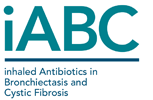iABC Launch
Launch of the iABC Project
The iABC project is a €50 million, Europe-wide, project to develop new drug treatments that could improve the lives of patients with cystic fibrosis and bronchiectasis.
The iABC (inhaled Antibiotics in Bronchiectasis and Cystic Fibrosis) consortium, which is made up of world-leading lung specialists from across Europe, will develop new ‘inhaled antibiotics’ to manage chronic lung infection, the main cause of disease and death in patients with cystic fibrosis and bronchiectasis.
The new antibiotics, which are to be trialed over a five year period and are being developed in response to an urgent need for new forms of inhaled antibiotics, are expected to improve patients’ quality of life by reducing lung infections and flare ups, improving lung function, and overcoming antibacterial resistance which frequently occurs in patients with these conditions.
The progamme will also establish the first European patient register for bronchiectasis, providing a platform to improve the quality of care for patients across Europe, as well as making it easier to develop and trial new drugs.
The Consortium is funded by the European Commission through the Innovative Medicines Initiative (IMI) and involves researchers from 20 organisations in eight countries across Europe.
Professor Stuart Elborn, Dean of the School of Medicine, Dentistry and Biomedical Sciences at Queen’s University, said: “There are limited antibiotics available to treat lung infection in cystic fibrosis and bronchiectasis, and the bacteria causing them are becoming increasingly resistant to current antibiotics. To ensure the development of new drug types we are bringing together world leading researchers with proven expertise in antibiotic development, clinical trials, and high-quality research.
“This work has the potential to deliver inhaled antibiotics that will improve the quality of life and survival of cystic fibrosis and bronchiectasis patients."



